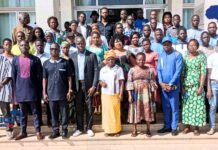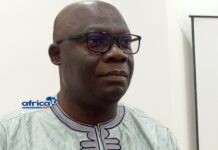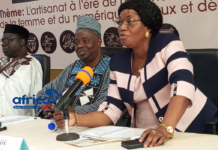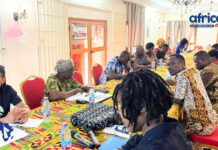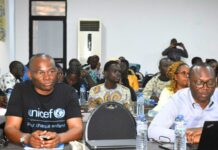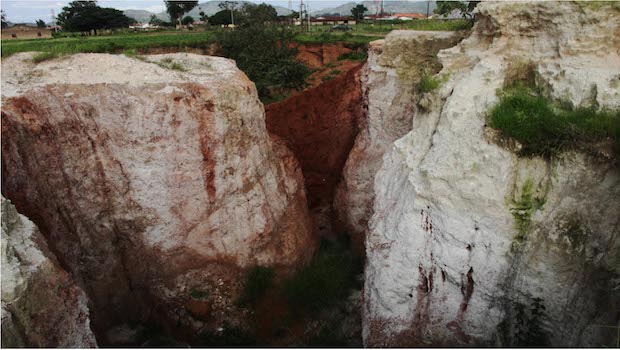Tin Mining in Jos started way back in1902 and by the mid 1940s the British government formally entered tin exploration and mining in the region making it the number one foreign export from Nigeria. However, the discovery of oil in the mid 1950s and the subsequent shift in emphasis from tin mining left present day Plateau State with the huge challenge posed by degradation and devastation, with over 4,000 abandoned mining ponds dotting the state, neglected and have continually posed a serious threat to the environment and the inhabitants.
Quite a lot of damages have been meted on the land, particularly around the Jos area of Plateau State.
These abandoned mining ponds are causing a lot of hazard to the residents, where dozens of people have been drown into the deep unmanned ponds. Unconfirmed reports have it that the mining ponds today are having radioactive elements, making them death traps.
 The image is quite is gory and devastating, it has created so many channels of real erosion which have grown into gully erosion which we are seeing the effects now.
The image is quite is gory and devastating, it has created so many channels of real erosion which have grown into gully erosion which we are seeing the effects now.
Farm lands discovered to have Tin deposits or are situated close to Tin Deposits are collected from the indigenous people without adequate compensation to service the interest of the mining activities and most time the owners of the lands are helpless and have no idea the amount of wealth that was being plundered from their land.
A good example is Gyel District of Jos South LGA which has about 81% of its land under mining leases some 60 years ago.
The ecological damage to the land in Jos and its environs is massive and started as early as the 1950s, when miners started cutting down trees for mining and fuel purposes, as well as digging the earth causing various levels of gully erosion.
The Plateau State Commissioner for Environment, Mr Sylvanus Dangtoe, said “When the land was excavated, they dug quite deep only God knows the depth of some of the pits and that has exposed some of the chemicals that were buried deep in the ground, some of these chemicals were quite dangerous, the radioactive elements can even cause cancer”
 However, due to the fact that large areas of ground are opened up during mining operations, weathering and erosion processes are accelerated and this penetrates deeper than in normal conditions. Mining scar disturbs the water table in many cases by altering upstream causes, thereby causing gully erosion by lowering the base level.
However, due to the fact that large areas of ground are opened up during mining operations, weathering and erosion processes are accelerated and this penetrates deeper than in normal conditions. Mining scar disturbs the water table in many cases by altering upstream causes, thereby causing gully erosion by lowering the base level.
The entire Plateau North is littered with many uncovered holes forming artificial lakes which are death traps to humans and animals.
The rich mineral endowment which is associated with the Jos-Plateau being referred to as Tin City however did not succeed in translating this wealth, development and opportunities to its people.
No wonder, the Plateau State Commissioner for Solid Mineral, Sani Agwom Zandi said “We did not maximally benefitted from the mining industry because licenses were given only to multinationals to mine under the supervision of the Federal Government, the proceeds goes to the federal government, the taxes also goes to them directly not to the plateau state government, so we didn’t directly benefit much from the mining activity”.
He also said “If you look at the environmental problems we have you will know that the companies did a lot of damages to the land and left without any reclamation plan”.
Michael Dantoro (not his real name) lives in the mining quarters allocated to him by the then miners in 1962, the one bedroom miners quarters is all he can boast of as he never received gratuity after he was laid off.
 The Plateau State Commissioner for Environment further said, the retired mine workers who still live around the mining ponds have no basic amenities, they use the water from the ponds for drinking. Speaking he said “On several occasions we have warned people living close to the area and have drawn the attention of the federal government as a matter of urgency to look at these areas, if the person in the Niger Delta is crying that his land has been degraded by the activities of oil exploration, then the Plateau man has every right to cry out for justice, tin is the backbone of the economy of this country, during that era quite a lot has been done, it has cause this devastation and degradation, the federal government should really look into how we can solve some of the problems that is caused by the activities of mining. We have looked at this as a very big problem that is causing a lot of health hazards, this fact has been recognized by governments at all levels, as well as the public, discontentment arising from the impact of tin mining on human security. Weak governance of the sector, lack of transparency, as well as weak regulatory framework contributed to these discontentments”.
The Plateau State Commissioner for Environment further said, the retired mine workers who still live around the mining ponds have no basic amenities, they use the water from the ponds for drinking. Speaking he said “On several occasions we have warned people living close to the area and have drawn the attention of the federal government as a matter of urgency to look at these areas, if the person in the Niger Delta is crying that his land has been degraded by the activities of oil exploration, then the Plateau man has every right to cry out for justice, tin is the backbone of the economy of this country, during that era quite a lot has been done, it has cause this devastation and degradation, the federal government should really look into how we can solve some of the problems that is caused by the activities of mining. We have looked at this as a very big problem that is causing a lot of health hazards, this fact has been recognized by governments at all levels, as well as the public, discontentment arising from the impact of tin mining on human security. Weak governance of the sector, lack of transparency, as well as weak regulatory framework contributed to these discontentments”.
Over all, the shift in emphasis from tin mining to crude oil, led to a decline in the contribution of tin to the formal economy, just as weak regulatory frameworks have contributed to the informality associated with tin mining in Jos, Plateau and beyond.
Improving environmental governance in the mining sub-sector is a critical step towards addressing the challenges posed by tin mining activities at both formal and informal levels.
Efforts towards addressing this challenge through the Ecological Funds given to the States by the federal government, as well as the move towards the call by civil society for the establishment of the Land Reclamation and Ecological Development Board in Plateau State has done little or nothing in tackling mining induced devastations in Plateau State and beyond.
Human Rights Organizations, such as the League for Human Rights have demonstrated interest in this area through advocacy between 2000 and 2006, but were forced to discontinue due to lack of funding for its work in this area, added to the lack of attention by government in the Nigerian mining sector. This has also weakened the resolve and resilience of the mine workers in the struggle for their rights.
The Commissioner for Environment confirm to us that the Plateau State Government through the Federal Government received about N2 billion in ecological funds between 1999 and 2007, adding that the funds were executed accordingly but the damage was beyond the fund dispersed.
He said “if you move round there are quite a number of projects that have been handled by the state government in trying to see that the ecological funds were properly put to use. From that period I cannot tell you how much have been given but then to some extent we have been able to identify the areas that needed urgent attention like the Yelwa Club junction pond that has been converted to a mini dam for the water to be treated and use for domestic use”.
 According to the Commissioner, “in the Du area, there are two ponds there that will be merged, if you also go opposite the polytechnic we are doing a project there, where the ecological funds are being put to use, we also have a project at Gashin Kuru which is ongoing and another one behind Standard Building and another at Relevant Technology”. These are projects that are presently handled by the state government. We have also identified quite a number of gully erosion sites that will soon be treated. The funds so far are channeled in the right direction and I assure you that the provisions are not really enough as the devastation are quite enormous. The road constructions being embarked by the local government is another way the funds are being used”, he remarked
According to the Commissioner, “in the Du area, there are two ponds there that will be merged, if you also go opposite the polytechnic we are doing a project there, where the ecological funds are being put to use, we also have a project at Gashin Kuru which is ongoing and another one behind Standard Building and another at Relevant Technology”. These are projects that are presently handled by the state government. We have also identified quite a number of gully erosion sites that will soon be treated. The funds so far are channeled in the right direction and I assure you that the provisions are not really enough as the devastation are quite enormous. The road constructions being embarked by the local government is another way the funds are being used”, he remarked
He further stated that “ before now road were not constructed with enough drainages, you can see and attest to the fact that the present road construction being done by this government have taken care of some of the ecological problems we have due to erosion. Quite a lot he said had been done with the ecological fund but the damage done to the environment outweighs the fund released, we have put it across in form of a proposal for more funds and the governor has approved it for the next administration coming in 2015 to start working on it”.
When asked about the radioactive emission from some of the mining ponds, the Commissioner affirmed that several group of people have undertaken studies on these areas and reported that some areas are indeed indicating high level of radioactivity
“but we cannot vouch for the equipment used during the studies, that is why we want to engaged an international consultant to come with standard equipments to take direct measurements of water and soil samples to reputable laboratories that are well known for such studies, so that we would actually confirmed, we want to authenticate it by making sure that the data we are taking out are data that we can take anywhere and defend it, depending on the result of the study. If we see that there are ways that we can appeal for help from international organization, why not? We are not talking in terms of just covering the ponds, there are some that are very useful and can be converted into dams to serve as reservoirs of water retention for block making, fisheries, resorts etc”.
By our Collaborator in Nigeria, with the support of Ford Foundation





